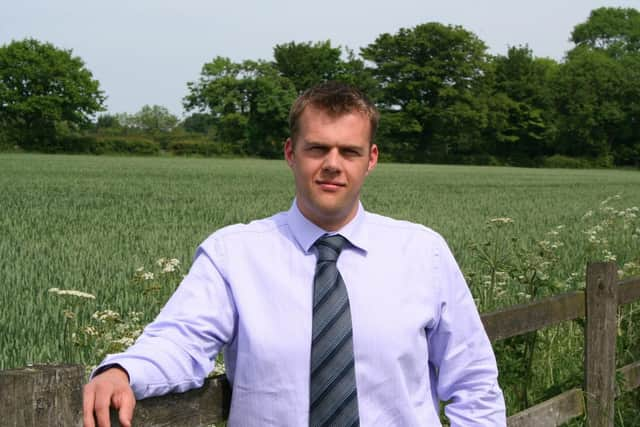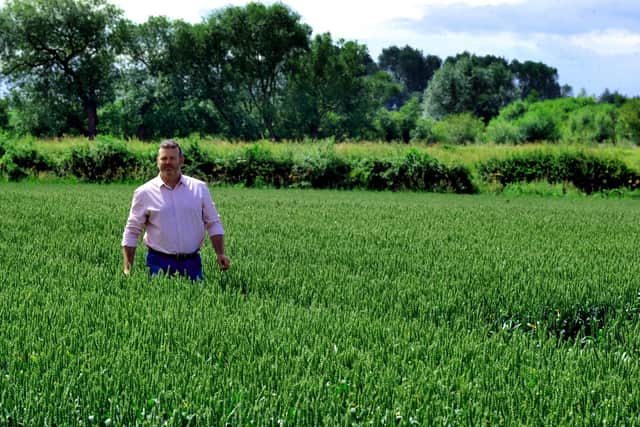Yorkshire farming officials concern over role of farmers in 'imminent' new payments trials
This article contains affiliate links. We may earn a small commission on items purchased through this article, but that does not affect our editorial judgement.


Advertisement
Hide AdAdvertisement
Hide Ad

The Department for Environment, Food and Rural Affairs (Defra) said it was working with 46 groups, all of which include farmers and land managers, to develop proposals to test how a new Environmental Land Management Scheme (ELMS) could work. Just two of these proposals are being led by farmers.
The new scheme has been hailed by Defra as the cornerstone of its future land management policy.
Current farm support payments delivered under the European Union’s Common Agricultural Policy and worth £3.2bn are proposed to be replaced by payments to reward farmers for “public goods”.
Advertisement
Hide AdAdvertisement
Hide AdThe scheme is intended to deliver clean and plentiful water, clean air and thriving plants and wildlife, and is also seen as a way of reducing and providing protection from ‘environmental hazards’, adapting to and mitigating climate change and improving engagement with the environment.


But farm union officials in Yorkshire said they were concerned by how few of the initial tests and trials are farmer-led and that this could represent a missed opportunity. They also expressed concern about the absence of firm definitions of the public goods that farmers will be rewarded for and about long-term guarantees over the scheme’s funding, with just two years until the scheme is due to be phased in gradually.
Commenting on the progress that has been made to develop the scheme, a spokeswoman for Defra said: “We have made significant progress on the specific ELM tests and trials programme. We received over 100 proposals from stakeholders to conduct tests and trials of the new ELM scheme in phase one.
“We have identified 46 of these which match the identified priorities and would be suitable for approval as tests and trials. They will help us test critical elements or building blocks of the new scheme.
Advertisement
Hide AdAdvertisement
Hide Ad“We are currently working closely with the 46 proposal holders to finalise their proposals. We hope to be in the position of being able to approve the first of the phase one proposals very shortly.
“This will depend on the complexity and cost of each individual test or trial and how quickly proposal holders are able to make the required revisions. The willingness to proceed on our side is very much there.”
The spokeswoman confirmed that Defra has also received more than 200 test and trial proposals for a second phase of testing.
The final scheme, proposed to be phased in over seven years until widespread adoption in 2028, will be “fundamental” to farm businesses and so it needs to be fit for purpose, ready as soon as possible and accessible to all, said James Copeland, regional environment and land use adviser at the National Farmers’ Union. But he has concerns about farmers’ input in setting up tests and trials so far.
Advertisement
Hide AdAdvertisement
Hide Ad“While initial trials include farmers, very few are led by farmers in the first phase. There is the potential for missed opportunities.
“Ultimately, farmers will know whether the scheme will work on their farms. They will be able to test what the challenges and opportunities are and inform a rounded scheme that can deliver multiple benefits,” he said.
The only guarantee made by the Government on future farm funding is that existing levels will be maintained until the end of the current Parliament, but this offers no clue as to the future ELMS budget.
“We need the Treasury to value these public goods and not only fund the work but the maintenance of it,” Mr Copeland said, referring to trees planted and field margins created under the scheme as examples of environmental features that require ongoing management. “If we don’t maintain them and value them by paying for them, we will lose them.”
Advertisement
Hide AdAdvertisement
Hide AdRichard Bramley, a member of the NFU’s environment forum who farms near York, said he was concerned about the lack of clarity over what the ELMS budget would be and what qualifies as a public good on farms.
“This is pretty essential in forming ELMS and mitigating the £3.2bn funding shortfall that is likely once we leave the Common Agricultural Policy,” said Mr Bramley.
He added that early applications for ELMS tests were “largely very specific”, which had inspired him to work with a cluster group in his area to submit an idea to be tested. Defra has not yet responded.
“A concern of mine is that a scheme is designed, then we are asked if we like it. It would be better to have more input in the design.”
Yorkshire testing
Advertisement
Hide AdAdvertisement
Hide AdTests and trials of a new ‘public goods’ payments scheme are being developed by farmer groups, representative bodies and non-governmental organisations covering a range of geographies and sectors, Defra said, with three already underway in Yorkshire.
A group of livestock farmers are being paid based on the delivery of habitats for breeding waders and species-rich meadows in the Yorkshire Dales; a payment by results trial is being led by the National Trust, and the North York Moors National Park is testing payments for different environmental outcomes.